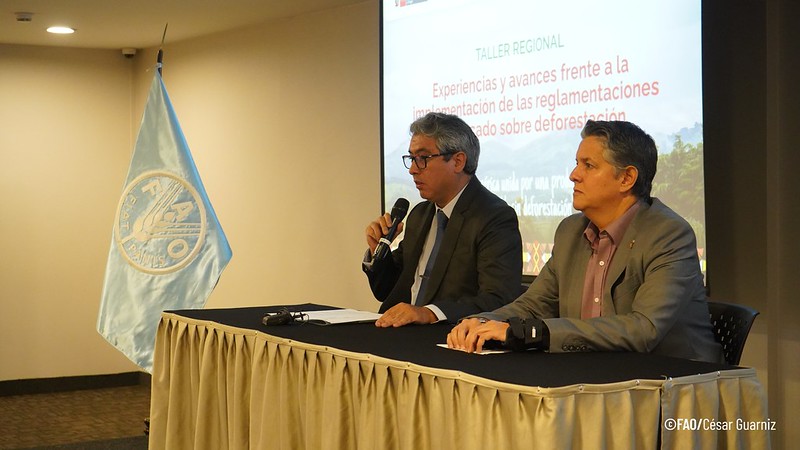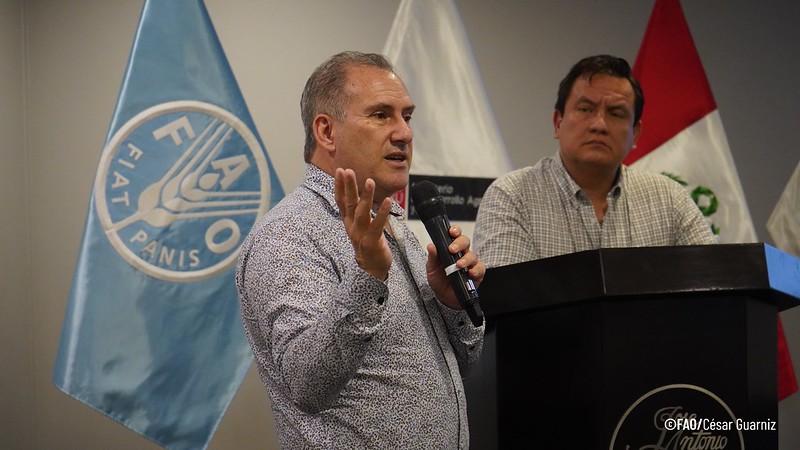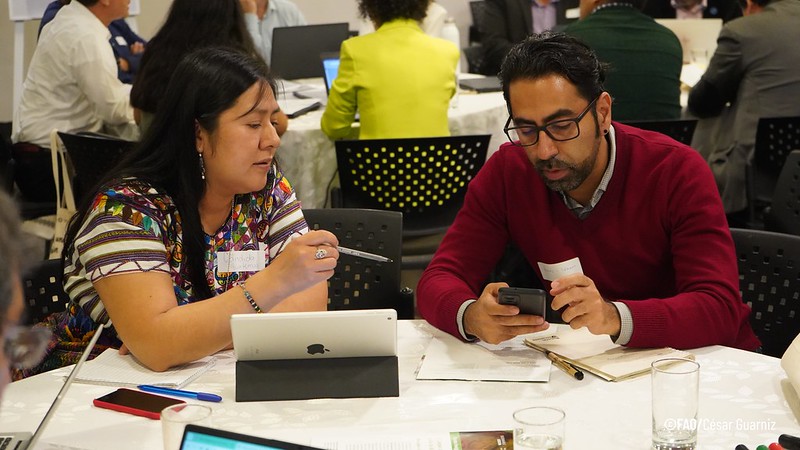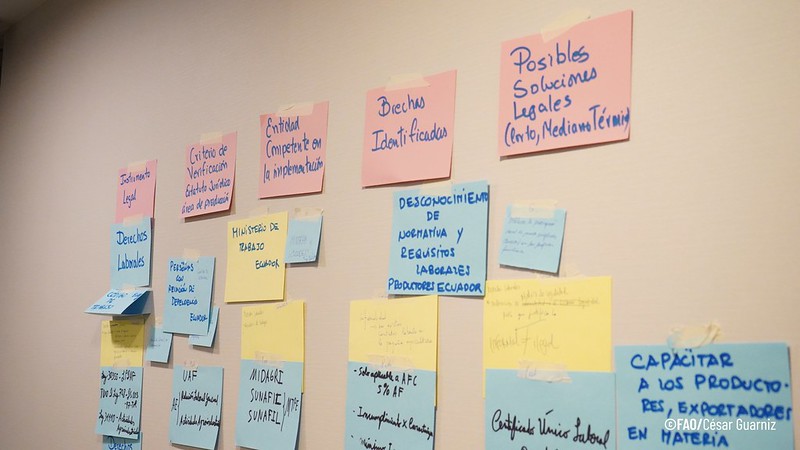Latin America prepares for new trade regulations on deforestation

From April 24-25 in Lima, Peru, the regional workshop "Experiences and Advances in the Implementation of Market Regulations on Deforestation" took place. This event was led by Peru's Ministries of Agrarian Development and Irrigation (MIDAGRI) and Foreign Trade and Tourism (MINCETUR), with technical support from the Food and Agriculture Organization of the United Nations (FAO).
The workshop, jointly organized by UN REDD, Accelerating Innovative Monitoring for Forests (AIM4Forests) and the Forest Data Partnership included 66 representatives from various organizations in Brazil, Colombia, Costa Rica, Ecuador, Honduras, Guatemala, and Peru, as well as the European Union Delegation (EU), the British Embassy in Peru, German Technical Cooperation (GIZ), Biodiversity Alliance-CIAT, and Solidaridad.
The workshop aimed to share strategies and approaches to address market demands related to deforestation, including the European Union's Deforestation Regulation (EUDR), among Latin American countries. It sought to accelerate understanding of these new rules and identify readiness actions to comply with them, focusing especially on the supply chains of cocoa, coffee, and palm oil in Peru.

Christian Garay, Vice Minister of Policies at MIDAGRI in Peru, highlighted the country's progress: "To comply with the European regulation, we have identified deforested areas and geolocated 90% of agricultural producers of coffee, cocoa, and palm oil nationwide. We are developing proposals for regulatory improvements for formal access to agricultural land and aspects related to the environmental management of agricultural units, to address the provisions of the European regulation."
During the workshop, four areas of work related to different aspects of the EU regulation on deforestation were addressed: geospatial information, traceability, legal criteria, and risk assessment and mitigation. Below is a summary of the discussions and proposals for each area of work.
Geospatial Information
Regarding geospatial information, the working group used the evaluation framework developed by AIM4Forests, which helped identify the data availability status, challenges, and readiness of the seven countries to provide geospatial information on the location and deforestation risk of agricultural plots. Data access and quality were highlighted as main challenges, with varying levels of preparedness among countries. A new open-source solution, Whisp (What is in that plot?), from the Open Foris family, developed through collaboration between AIM4Forests and the Forest Data Partnership, was presented as potentially useful for advancing geospatial analysis. It aims to implement convergence of evidence within any land plot with relevant forest monitoring information and support the implementation of the EU Regulation on deforestation-free products. Proposals included regional collaborative work, developing webinars and training sessions in Spanish, and conducting pilot experiences of the solutions in Colombia and Ecuador.


Traceability
Discussions on traceability covered data governance, the role of governments, technical solutions, and the sustainability of the traceability system. Identified risks included monopolization and misuse of data, highlighting the need for transparency, quality, and governance agreements between public and private sectors. Proposals included creating a unified regional platform for collecting interoperable supply chain information, developing training and communication activities for producers and their organizations, and supporting the formalization of the sector.
Legal Criteria
A rapid gap assessment based on the legal matrix indicated that some dimensions require special attention, such as the protection of human rights. Seven blocks of legality were identified: land use rights; environmental protection; regulations related to forests, including forest management and biodiversity conservation, when directly related to timber use; third-party rights; labor rights; human rights protected under international law; the principle of free, prior, and informed consent, as contemplated in the United Nations Declaration on the Rights of Indigenous Peoples; and fiscal, anti-corruption, commercial, and customs regulations. These seven dimensions are relevant to the EU regulation. Proposals included building national repositories of relevant legal instruments, exploring the adoption of transitional legal instruments, and developing checklists and compliance tests for operators to help differentiate between informality and illegality. Legal criteria for demand-side requirements are a particular focus of the UN-REDD Programme.


Risk Assessment and Mitigation
Challenges in identifying and categorizing risks of non-compliance with the EUDR's criteria and information requirements were discussed. The working group noted challenges such as understanding what can be considered a "negligible" risk, the informality of value chains, communication, and coordination among different stakeholders, and the need for more guidance and support from the EU. Proposals included developing complementary tools and mitigation measures, creating national roadmaps, and engaging with the private sector. An example presented was the manual developed between the Organization for Economic Co-operation and Development (OECD) and FAO for companies on deforestation and due diligence in agricultural supply chains.
Towards More Sustainable Production
Caroline Merle, FAO's Forestry Officer, reaffirmed the organization's commitment to supporting countries in their journey towards more sustainable production: "From FAO, we are accompanying countries in their efforts to respond to market demands. The goal is to promote sustainable value chains that contribute to halting deforestation and using forests sustainably, while generating economic and social benefits for countries and their rural communities."
Among the main actions proposed in the workshop to improve countries' preparedness for the new regulations were promoting greater institutional coordination and national roadmaps, improving direct government engagement with companies, considering producer associations as a key asset for compliance with the regulation, and strengthening due diligence guidance for operators.
In conclusion, the workshop proved to be a crucial platform for identifying and promoting effective strategies that foster due diligence towards sustainable production and providing countries with technical tools to adapt, if they so wish, to new trade regulations on deforestation. Its usefulness lay in facilitating the exchange of knowledge and experiences, as well as reinforcing the commitment of participating countries towards more sustainable and inclusive production. FAO will continue to support these processes through technical advice, thanks to UN-REDD, AIM4Forests, and the Forest Data Partnership.

See the video of the workshop and the photos on Flickr
Read the article in Spanish: América Latina se prepara para nuevas reglamentaciones comerciales sobre deforestación
Reglamento de la Unión Europea (UE) sobre productos libres de deforestación
